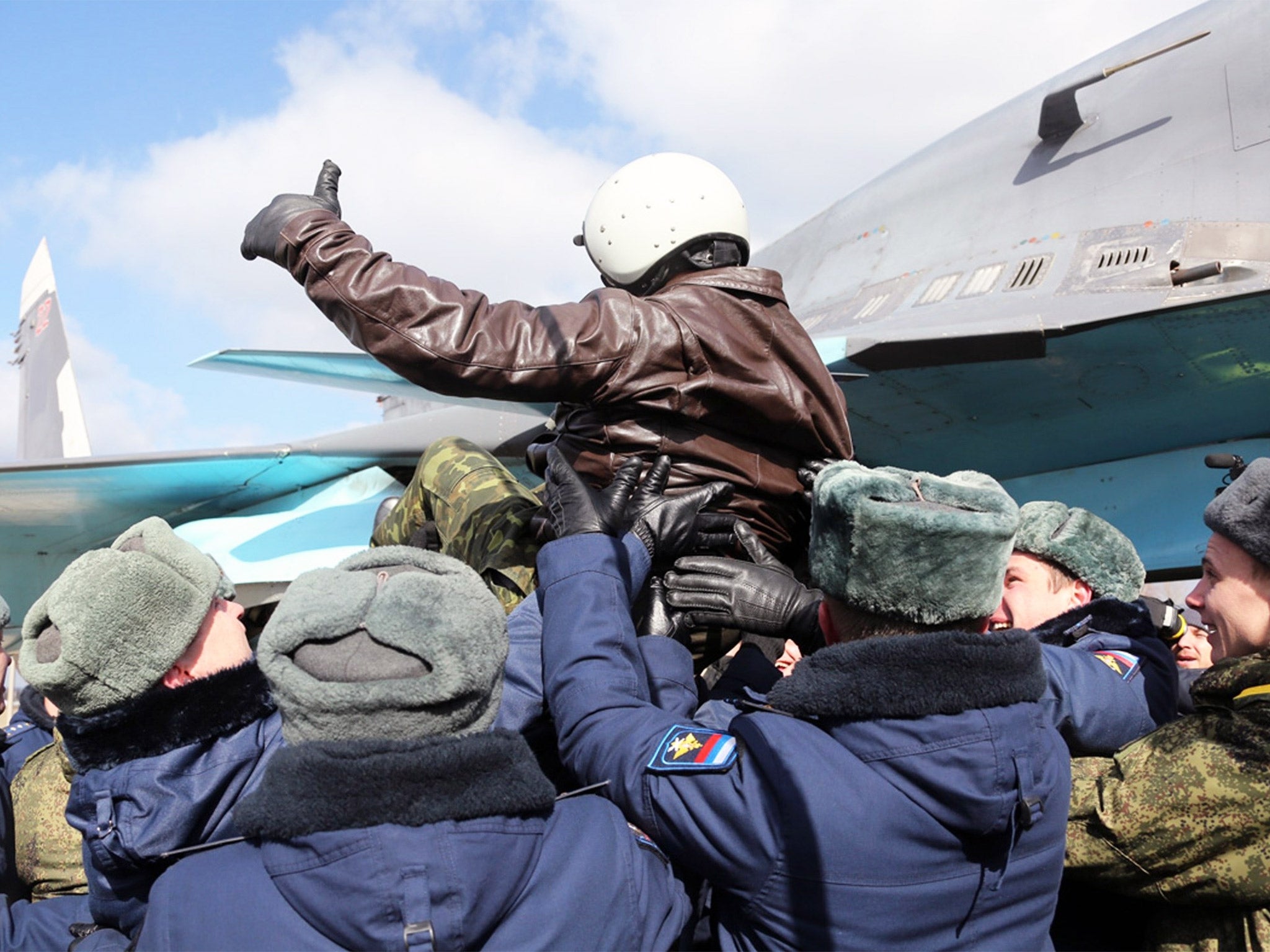Russian pilots arrive back home from Syria to a hero's welcome
Crowds threw the pilots into the air while Russia’s state television filmed the celebrations

As the first contingent of warplanes from Russia’s airbase in Latakia touched down at an airport in Russia’s southern city of Voronezh, throngs of cheering people carrying balloons gave the pilots a hero’s welcome. To the bombastic sounds of a brass band playing behind them, the crowds threw the pilots into the air while Russia’s state television filmed the celebrations. The scenes appeared to show off Russia’s military successes and signal the end of a war.
It was a scene Russia’s state television broadcast throughout the day, as news anchors heralded the withdrawal of Russia’s troops from Syria and the beginning of what they described as Russia’s main pursuit all along: peace in Syria.
At a ceremony near Voronezh, head of Russia’s Air Force Colonel General Viktor Bondarev praised the precision of Russia’s pilots, telling crowds that in more than 9,000 sorties over six months of Russian airstrikes in Syria, "there was not one bombing that was not on target, not one bombing of sensitive objects”.
News programmes were regularly interrupted by footage of Russian ground crew in the Latakia airbase loading equipment and cargo onto a transport plane headed back to Russia. Russian military commanders and defence commentators, praising the “success” of Russia’s military intervention in the Syrian war, were video-called in.
Kremlin-sponsored news outlet Sputnik echoed the government’s line that the withdrawal of troops “will help stimulate the process of settling the Syrian crisis politically”, while the edition of state-backed newspaper Rossiskaya Gazeta ran a one-word headline: “Home!”
The scenes of victory came on the heels of a surprise announcement from Russian President Vladimir Putin late on 14 March that “the main part of [Russia’s] military contingent [in Syria]” would return home to Russia. Russia’s military campaign in support of Syrian President Bashar al Assad, Mr Putin said in the meeting with his defence and foreign ministers, had “largely achieved its goals”.
Following the announcement, Kremlin spokesperson Dmitry Peskov said that Mr Assad had agreed to the decision during a telephone call with Mr Putin.
But despite the celebrations over the start of the withdrawal of Russia’s troops from bases in Syria, Russia’s defence ministry has said that Russia will continue its airstrikes “against Isis and other terrorist organisations”. Deputy defence minister Nikolay Pankov said that “certain positive results have been achieved”, but that it was still too early “to talk about victory over terrorism”, Ria Novosti reported. “A Russian air group has the task of continuing to strike terrorist facilities,” he said.
A senior official from the upper house defence committee, Viktor Ozerov, has said that as many as 800 servicemen could remain in Syria to protect the two Russian bases - its air base in Latakia and its naval facility in the Syrian port of Tartus – which are to remain operational.
Head of the Presidential administration Sergei Ivanov said that Russia’s S-400 surface-to-air missile system will also stay in place at Russia’s bases in Syria. The powerful systems were deployed to the bases in November last year following the downing of a Russian jet along the Syrian border by a Turkish fighter plane.
Russia has justified its military intervention in Syria’s civil war as a campaign against Isis and other terrorist organisations. However activists and western observers, since the first days of Russian airstrikes in September last year, have claimed that Russia’s presence in Syria has been to prop up President Bashar al Assad by targeting the majority of its strikes against Mr Assad’s more moderate political opponents, not Isis.
In December last year, Amnesty International said that Russian airstrikes had struck civilian areas where no military targets were evident, something that could amount to a war crime. Moreover, the Syrian Observatory for Human Rights claimed last month that Russian strikes were responsible for the bombing of hospitals in two towns alleged to have been under attack from forces in support of President Assad. Russia vehemently denies the accusation.
Subscribe to Independent Premium to bookmark this article
Want to bookmark your favourite articles and stories to read or reference later? Start your Independent Premium subscription today.

Join our commenting forum
Join thought-provoking conversations, follow other Independent readers and see their replies